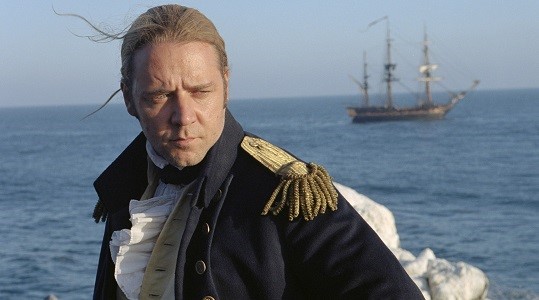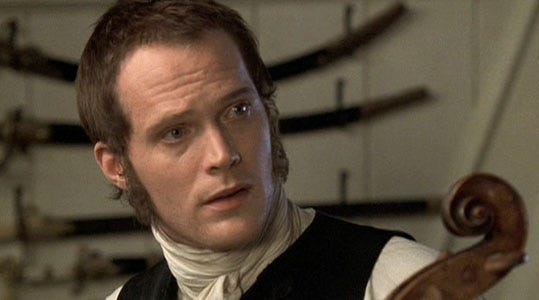It is no secret that Hollywood puts out an awful lot of terrible films and things have gotten considerably worse in the last few years. Even studios like Pixar (that once consistently put out great films), have had a string of disasters in recent years. What is amazing about this is that much of it is quite deliberate. With this in mind, one must be reminded that very little of what Hollywood puts out at any time is very good. Most film releases in any given year are quickly forgotten — as indeed are most new novels and video games. This includes many films that are financially and/or critically successful and even a lot of multi-award winners.
Occasionally there is a film that only makes a minor splash on release but later comes to be much better appreciated. Peter Weir’s Master and Commander: The Far Side of the World from 2003, is one such film.

Master and Commander turned twenty in November last year and I had meant to write this review around that time but I wanted to re-watch it first and didn’t get around to it until Christmas. It is based on a series of historical novels written by Patrick O’Brian set during the Napoleonic Wars. The film’s title combines two titles in the series and the film is something of a composite of other books though I have only read the first novel and can’t claim knowledge beyond this. The stories focus on the friendship between Jack Aubrey and Stephen Maturin which is largely true of the film as well.
Aubrey is played Russell Crowe who was at the time of the film’s release, one of the most recognisable actors in Hollywood with the success of Ridley Scott’s Gladiator a few years earlier. His star power didn’t bring the box office gains I’m sure the studio was hoping for but he was still well chosen for the role. Maturin is played by English actor Paul Bettany who is better known for his roles in superhero films these days. I noticed while working on this that they both appeared together in A Beautiful Mind which is a perfect example of how forgettable many films are. It is a bit of a cliché to write about on-screen chemistry but these two certainly have it. Crowe dominates (as he must being the captain), but both actors successfully convey a realistic friendship between two men in circumstances that can quickly go from humdrum to intense — as is the nature of a ship of war.
The director Peter Weir is best known to Australians for the 1981 film Gallipoli which focuses on Australian and New Zealand soldiers during the Great War. What was an embarrassing military blunder to British and French historians is considered (perhaps a tad hyperbolically) to be a baptism of fire to the Anzacs today. The film stars a young Mel Gibson and the only blemish is the anti-British sentiment no doubt courtesy of the film’s screenwriter David Williamson. To most audiences Weir would be best known for the 1989 film Dead Poet’s Society starring Robin Williams or perhaps 1998’s The Truman Show starring Jim Carrey. Weir’s output has been relatively sparse over his long career but his reputation is such that his films are generally worth seeing when he decides to make one. For what my opinion is worth, Master and Commander is by far the best film he has ever made and I wouldn’t be surprised if he thought so himself given its rise in esteem in recent years.

In saying the above, I’m conscious that Weir may not find the reasons for the film’s improving reputation to his liking depending on his politics. The film is unapologetically and energetically masculine. So much so that not one woman speaks in the entire film’s runtime though some appear on screen and they are certainly come up in conversation. I understand this would instantly fail the film by a rubric devised by a feminist though I don’t care to recall what that test is called or who came up with it. Negative results on tests such as this generally speak to a film’s high quality in my estimation.
The film is set in 1805 which is the same year as the Battle of Trafalgar which I imagine the fictional captain would have been shattered to have missed taking part in. The British already had a reputation for dominance at sea which the aforementioned battle only cemented for more than a century afterwards. This is so ingrained that many still imagine the British to have a proud navy though it is in reality quite impotent today. At the time the film is set, there was little more manly than a British sailor and the film certainly shows this. Aubrey loves the British Empire, its navy and his then living hero Horatio Nelson.
Maturin being of mixed heritage (Catalan and Irish), unsurprisingly doesn’t share the same love of God, King and Empire that his friend does. He has a very practical role on the ship as the surgeon but his true passion (at least in the film), is for the natural sciences. The latter provides for some minor conflict between Aubrey when they come upon the Galápagos Islands while playing cat and mouse with a French ship. Aubrey is focused on pursuing his mission while Maturin sees an opportunity for unique scientific investigation. This gets somewhat heated before Maturin is reminded of his place. Nonetheless, circumstances allow him a brief exploration where some of the most beautiful scenes in the film of animal life on these islands is shown. These were shot on location too.
The above leads into my only real problem in the film which is a minor one. This is the unsubtle hints at Darwinism told through Maturin’s investigations. In the books he is more of a political radical though this side of him is muted in the film. It shows him as something of a progenitor of Charles Darwin’s work later in the century. Though the opportunity to show such a scenic area of the world is welcome, it does overstay this welcome. I noticed while writing that Christopher Hitchens enjoyed this aspect which is all the more reason for me to dislike it.

There is still a moral core to the film that is seen in so few where the worst of humanity is more a focus. There is a clear and respected hierarchy onboard the ship — as shown between Aubrey and Maturin. The crew show respect to their officers and where one falters, they are punished quite severely for the infraction. The film somewhat sanitises the floggings which were not at all uncommon on British ships, the British Army or even as a punishment for criminal behaviour outside the armed forces. The officers are well spoken and educated and though the men under them are certainly coarser, they still have a sense of duty and goodness about them. In one particularly moving scene in the last moments of the film, Aubrey leads the crew in the Lord’s Prayer as they say farewell to their fallen comrades. There is not a hint of the contempt for religion you normally get in such films and I expect Hitchens probably didn’t enjoy this scene.
One could be forgiven for expecting more action in a film with Crowe’s name at the top but much of the film shows the more mundane aspects of life on the ship. This might sound like a criticism but it is so well done that these scenes are plenty engaging. The first time I saw it, I was expecting more action so this was something I only came to appreciate on later viewings. The climax of the film more than makes up for the slower scenes with an exciting and bloody battle between the British HMS Surprise and a much larger French Frigate called Acheron.
As for the soundtrack, I have the CD. The original score is very good but it also includes a number of pieces by Mozart, Bach and Corelli. What makes this stand out is that Aubrey and Maturin are playing manty of them. One love they both share without disagreement is a love of music and there are a number of scenes in the film of them playing the soundtrack during montages of ship life. Apparently Crowe, himself a musician, even spent time learning violin for the role.
The sad aspect of the film as that there will likely never be a sequel with Crowe and Bettany — if at all. It had modest success but not enough to budget a sequel. It doesn’t matter though as the film stands quite well on its own. I have to remind myself that not everything needs a sequel and this is true of this film even with all the written material available for further adaptations.
This is one of the few films that I absolutely recommend without reservation.
